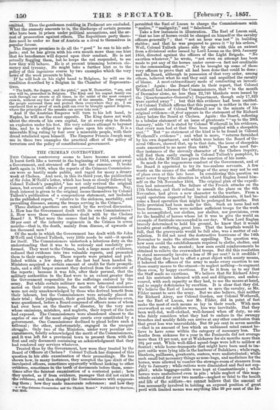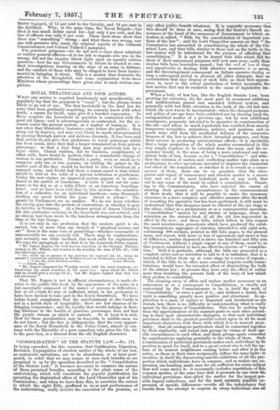THE CRIMEAN CONTROVERSY.
Tars Crimean controversy seems to have become an annual. It burst forth like a torrent in the beginning of 1855, swept away a Government, and streamed off far into the summer. It broke forth again in 1856, when the reports of the Crimean Commissioners were so hastily, made public, and raged for many a dreary week at Chelsea. And now, in this its third year, the publication of Sir John M'Neill's letter, which has been so closely followed by Colonel Tullooh's pamphlet,* has not only revived the original issues, but several others of present practical importance. Nay, fresh interest is given to the original issues themselves by Colonel Tulloch's publication of a compendious statement, not included in the published report, "relative to the sickness, mortality, and prevailing diseases, among the troops serving in the Crimea."
Three distinct queations are raised by the revived discussion. 1. How has the Government dealt with its own Commissioners ?
2. How were those Commissioners dealt with by the Chelsea Board ? 3. What were the causes that led to the perishing of 39 per cent of the infantry regiments in the Crimea in seven months—that is, the death, mainly from disease, of upwards of ten thousand men ?
Of the mode in which the Government has dealt with Sir John M'Neill and Colonel Tulloch, yery little needs be said—it speaks for itself. The Commissioners undertook a laborious duty on the understanding that it was to be seriously and resolutely performed. They went to the Crimea, took a large mass of evidence, reduced that evidence into two valuable reports, and presented them to their employers. Those reports were printed and published within a few days after the last had been handed in. Ministers acquired a certain amount of credit for their promptitude, and a still larger amount they derived from the contents of the reports ; because it was felt, after their perusal, that the military authorities in the East were to an extent greater than the Government responsible for the sufferings endured by the army. But while certain military men were honoured and promoted on their return home the merits of the Commissioners were not only unacknowledged by those who derived benefit from their labours, but the Commissioners were actually placed on their trial ; their judgment, their good faith, their motives even, were questioned, before a Board composed of officers none of whom had ever been on the theatre of disaster,by the very men whose omissions, mistakes? and neglects, their report of the facts had exposed. The Commissioners were abandoned almost to the caprice of one of the most singular courts ever constituted by a government. One Commissioner declined to plead before such a tribunal ; the other, unfortunately, engaged in the unequal struggle. Only two of the Ministers, under very peculiar circumstances' faintly acknowledged the merit of the Commissioners, and it was left for a provincial town to present them with the first and only document containing an acknowledgment that they had rendered any services whatever. Treated. thus by the Government, how were they treated by, the Board of Officers at Chelsea ? Colonel Tulloch has disposed of this question in his able examination of their proceedings. He has shown how, in many instances, they accepted the ipso dixit of the inculpated officers, sometimes apparently without looking to other evidence, sometimes in the teeth of documents before them' sometimes after the faintest examination of a contested point; how they quoted, as if from evidence, passages that did not exist in the evidence, and then charged the Commissioners with suppressing them ; how they made inaccurate references ; and how they v.. The Crimean Commission and the Chelsea Board." Published by Harrison, Pall Mall.
permitted the Earl of Liman to charge the Commissioners with "malice," "malignity," and "falsehood."
Take a few instances in illustration. The Earl of Lucan said, "that no loss of horses could be charged on himself or the cavalry officers generally" ; that "not an hour was lost" in building stables; and that he was prepared to prove it "by his orders." Well, Colonel Tulloch places side by side with this an extract from a divisional order issued by Lord. Lucan on the 20th January 1855, directed against the officers of the Light Brigade. "No exertion whatever," he wrote, "not even an attempt has been made to put any of the horses under cover—a fact not creditable to the commanding officers." Yet he brought up some of these very officers to prove that all had been done that could be done ; and the Board, although in possession of that very order, among others, believed what he and they said and acquitted the cavalry of blame. A most extraordinary mode of conducting an investigation! Again : the Board state in their report, that Colonel Wetherell had informed the Commissioners, that "in the month of December alone, no less than 22,740 blankets were issued by the [Quartermaster-General's] Department, though only 17,323 were carried away" ; but that this evidence had been omitted. Yet Colonel Tulloch affirms that this passage is neither in the corrected evidence of Colonel Wetherell nor in the minute of his original evidence—itfirst appears in the statement of Sir Richard Airey before the Board at Chelsea. Again : the Board, referring to a tabular statement of an issue of greatcoats "'up to the 20th January,' adds it is stated by Colonel Wetherell in his evidence, that every man had at that time been supplied with a sheepskin coat.'" But "no statement of the kind is to be found in Colonel Wetherall's evidence" ; and what is more, "returns furnished by his own department, and which were before the Board of General Officers, showed that, up to that date, the issue of sheepskin coats amounted to no more than 6464." Those who need further instances of the slovenly character of the Chelsea inquiry, will find them easily enough in Colonel Tulloch's pamphlet, to which Sir John M'Neill has given the sanction of his name. So much for the ungenerous conduct of the Government, and of the Board it appointed to try its too-zealous servants. A few words on the causes of the sufferings of the army may not be out of place even at this late hour. In considering this question we must never forget the situation in which Lord Raglan found himself on the 7th November 1854. The original plan of the expedition had miscarried. The failure of the French attacks on the 17th October, and their refusal to assault the place on the 6th November, had given a new character to the warfare. From a rapid operation supported by limited establishments, it had become a fixed operation that might be prolonged for months. But little provision had been made for this. Such an issue had not been foreseen. There were neither sufficient troops for the work to be accomplished, nor clothes, nor shelter, nor provisions, even for the handful of heroes whose lot it was to give the world an example of fortitude unexampled in our day. When Lord Raglan bravely determined to hold his ground, he knew that it would involve great suffering, great loss. That the hospitals would be full, that the graveyards would be full also, was a matter of calculation. It did not need the destructive hurricane of the 14th November to make the situation appalling. The question was, how soon could the establishments required to clothe, shelter, and victual the army, be created; how soon could reinforcements be obtained to relieve the overworked troops. But did this resolution to stand necessarily involve a loss of 39 per cent ? is it credible? Finding that they had to effect a great object with scanty means, it behoved the officers of the army to make every exertion to use those scanty means to the utmost—to neglect nothing—to augment them even, by happy exertions. Far be it from us to say that the Staff made no exertions. We believe that Sir Richard Airey and his assistants laboured with zeal and diligence, and endeavoured, with such capacity as they had, to use the means at hand, and to supply, deficiencies by exertion. It is clear that they did. We believe the Earl of Lucan meant to save the cavalry, as Mr. Filar meant to save the army. But we also believe, that neither Sir Richard Airey, nor Colonel Gordon, nor Colonel Wetherell, nor the Earl of Lucan, nor Mr. Filder, did in point of fad make the most of such means as lay in their reach. With men overworked as our soldiers were, loss was inevitable. Had they been well-fed, well-clothed, well-housed when off duty, no one who fairly considers what they had to endure in the swampy trenches and muddy fields can arrive at any other conclusion than that great loss was unavoidable. But 39 per cent in seven months —that is an amount of loss which an unbiassed mind cannot believe to have come within the category of necessary loss. The deaths from sickness for a year in the Peninsula did not average more than 12 per cent, nor at Walcheren for six months more than 101 per cent. While well-filled squad-bags were left to mildew at Soutari ; while horse-transports that might have been used to import cattle were lying idle in the harbour of Baleklava ; while rugs, blankets, paillasses, greatcoats, coatees, were undistributed; while such small but necessary things as nose-bags, and medicines for the horses, were allowed to cumber the stowage-room of steamers from July to January ; while rations were diminished and fuel not sup plied ; while baggage-cattle were kept at Constantinople ; while horses were unsheltered even in pits ; while neglect of this magnitude existed for over two months—neglect so fatal to the health and life of the soldiers—we cannot believe that the amount of loss necessarily involved in holding an exposed position of great peril with limited means was anything like 39 per cent of the In
fantry engaged, of 10 per cent in the Cavalry, and 18 per cent in the Artillery. Why, at the same time, the Naval Brigade--but then it was much better cared for—lost only 4 per cent, and the loss of officers was only 6 per cent. These facts alone show that there was " something " wrong ; and what there was wrong, any one will perceive who reads the original reports of the Crimean Commissioners and Colonel Tulloch's pamphlet. For practical purposes—we do not now-a-days shoot admirals or cashier general officers—it is too late to inquire who was in the wrong, did not the inquiry throw light upon an equally serious question—how far can Governments in future be trusted to confind investigations bearing on the state of an army in distress, and the conduct of those who may be alleged to have been instrumental in bringing it about. This is a matter that demands the attention of the thoughtful, and some explanation from those Ministers whose proceedings have given rise to such serious suspicions.



































 Previous page
Previous page